Days of Decision. While the Greek drama moved towards a decision, I travelled into the interior of the new Greece. Meetings with Alexis Tsipras, his closest aids, local activists, young businessmen, working-class militants and people, who just manage to survive.
Translation: Barbara Stanzl (Spiralcat-Translations). The German Version of this Essay you can find here.
You want support that kind of journalism? So please help to crowdfund this report and further researches: Bankaccount: Robert Misik. IBAN AT 301200050386142129 / BIC= BKAUATWW
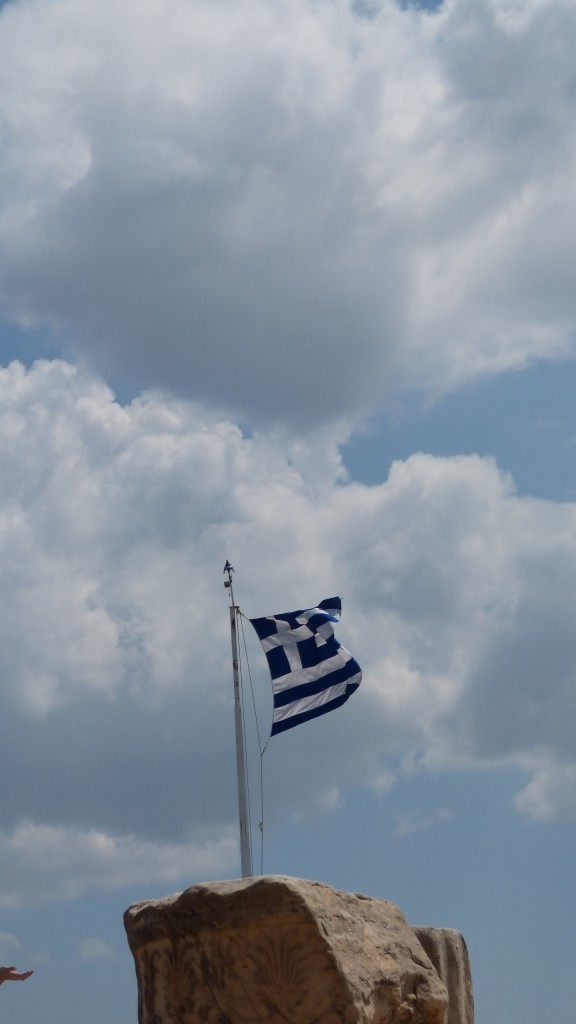 “To our government,” Nikos shouts, slightly sarcastically. While we are lifting our beers, Katerina adds with an additional pinch of irony and a touch of bitterness, “It’s high time that we actually start to govern.” We’re sitting at the Café Stretto in Thessaloniki and the Greece Emergency crisis summit with EU Zone leaders from last Monday evening had just finished. The latest news is coming in. There are indications that Alexis Tsipras has in fact moved his position in the direction the creditors want and that an agreement isn’t far away. Details are still lacking at this point.
“To our government,” Nikos shouts, slightly sarcastically. While we are lifting our beers, Katerina adds with an additional pinch of irony and a touch of bitterness, “It’s high time that we actually start to govern.” We’re sitting at the Café Stretto in Thessaloniki and the Greece Emergency crisis summit with EU Zone leaders from last Monday evening had just finished. The latest news is coming in. There are indications that Alexis Tsipras has in fact moved his position in the direction the creditors want and that an agreement isn’t far away. Details are still lacking at this point.
The next morning laughter has been replaced by shock. Katerina Notopoulous’s mobile rings every minute. The 27 year old is a member of the central committee of the governing Syriza party.
We actually wanted to take the day off and drive to the coast. „Thank you Merkel and Alexis. You’ve screwed up my day,“ she says, between two telephone calls, with a strained grin and a sour face. The calls are from two outraged party members who can’t believe that the Tsipras government could agree to a new and fatal austerity program of over eight billion euros. I’m tearing along the bumpy streets to Chalkidiki in our little Fiat.
An austerity program which only prolongs fears and makes everything worse? A more of the same, more harsh medicine? Hardly anybody can imagine at the moment how Tsipras is going to get the agreement past his party or his group in parliament. It seems to the Syriza functionaries that they have the choice of two nightmare scenarios, either supporting an agreement that is almost criminally irresponsible or voting against it and bringing down the government.
“I’m scared,” whispers Nikos, the local party secretary. “We can’t defend this agreement, it’s impossible,” says Katerina and shrugs. There are a lot of rumours: Tsipras wants to agree because he doesn’t want to be the one who leads Greece out of the Eurozone. Yanis Varoufakis the finance minister and Euclid Tsakalotos the chief economic spokesman are said to be strictly against the agreement.
Athens, a few days beforehand. The sun is beating down on Maximos Mansion. The official residence of the Greek prime minister looks a little like a shrunken version of the White House. Left and right, palm trees are shimmering in the heat. Here too, on a Saturday morning, the revolution is very slowly progressing. It’s a revolution of its own particular kind but what does it want? Stop the austerity trend in Europe? Save Greece? Or even try a contemporary form of socialism?
I’m walking through the side entrance and through the entrance control upstairs into the domain of Alexis Tsipras. The young woman in the hallway is smiling. In Austria you would call her a secretary or receptionist, but in a socialist party like Syriza, whose activists are all used to opposition but who have suddenly ended up in the government, it would be a little inappropriate. In the language of the left, she would more likely be called a comrade who organises the office. Here German is the second lingua franca. Many people have studied in Germany, quite a few have grown up in Germany and speak with a Berlin or a north German accent. “We talk in German when we speak about secret issues so that the civil servants can’t understand us,” a Syriza worker told me and laughed.
Naturally, Dimitris Tzanakopoulos also speaks German. His official job title is “general secretary of the prime minister” which is something like the chief of the chancellery, Tsipras‘ right hand. If the threads of the new power around the modern, smart and young group of men around Tsipras, Tzanakopoulos and state minister Nikos Pappas connect anywhere, they connect here. “We practically had to negotiate the most difficult issues from day one, with our back to the wall and it’s the very first time for us that we’ve been part of a government,” he says, remembering the days when Alexis Tsipras moved into government headquarters in January. “We had no experience whatsoever. They were difficult times.”
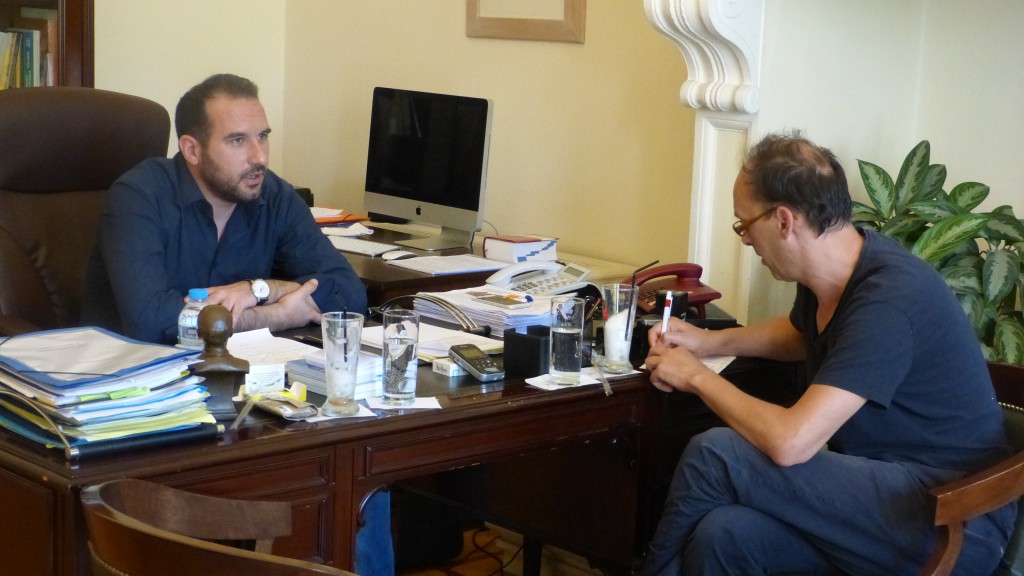 “We on the left are always in opposition,” I’m thinking aloud. “Yes that’s in our DNA,” Tzanakopoulos laughs. People on the left have a kind of opposition gene and in particular an anti-establishment alliance like Syriza is. Eight years ago they were down at eight percent. To actually govern and be in power is something else. “Actual power is more like a labyrinth than a hierarchy.“ Ironic look, shirt, jeans, stubble, the Syriza strategist wouldn’t be noticed in a trendy hipster bar. Syriza holds undisputed power in Greece but, as the party of the left, it still feels like it’s in opposition to the “current ascendancy of neoliberal thought” however you want to term it and, with the Europeans acting in concert, the Greek government is in opposition to the group of countries who are in the driving seat. They are the governing opposition or the opposition in government. This characterises their identity and their style. Tzanakopoulos, Pappas, Tsipras are the pragmatists amongst this governing opposition. Without a certain feeling for what is possible and some special skills, for example being able to communicate with the Greek public, they wouldn’t have come this far and the last five months were a crash course in “European reality” which means that they’ve also learned to judge the limits of their opponents, whether somebody is perhaps a potential ally or absolutely opposed to them. Or you could say that they’ve gotten a bit better at it.
“We on the left are always in opposition,” I’m thinking aloud. “Yes that’s in our DNA,” Tzanakopoulos laughs. People on the left have a kind of opposition gene and in particular an anti-establishment alliance like Syriza is. Eight years ago they were down at eight percent. To actually govern and be in power is something else. “Actual power is more like a labyrinth than a hierarchy.“ Ironic look, shirt, jeans, stubble, the Syriza strategist wouldn’t be noticed in a trendy hipster bar. Syriza holds undisputed power in Greece but, as the party of the left, it still feels like it’s in opposition to the “current ascendancy of neoliberal thought” however you want to term it and, with the Europeans acting in concert, the Greek government is in opposition to the group of countries who are in the driving seat. They are the governing opposition or the opposition in government. This characterises their identity and their style. Tzanakopoulos, Pappas, Tsipras are the pragmatists amongst this governing opposition. Without a certain feeling for what is possible and some special skills, for example being able to communicate with the Greek public, they wouldn’t have come this far and the last five months were a crash course in “European reality” which means that they’ve also learned to judge the limits of their opponents, whether somebody is perhaps a potential ally or absolutely opposed to them. Or you could say that they’ve gotten a bit better at it.
Sometimes I also wonder if they have the wrong impression of the hairline political cracks within Europe. Did this government of the left, who only really wanted to run a text-book, socialist, Keynesian economic policy, have to isolate themselves like this? Maybe more would have been possible. “The neoliberals have had the upper hand in Europe for thirty years and we want to move away from that, in form as well as substance,” Tzanakopoulos replies. Which means away from not only the chronic redistribution of all resources and opportunities from the underprivileged to the already privileged, but also a style of government that is fixated on attacking democracy, pacification of the public and the redistribution of all power upwards. In other words more justice and more democracy. If you want that, says Tzanakopoulos, you can’t expect, within neoliberal technocratic Europe, that the potential allies will come running to you. “These are political mechanisms that, in the end, disenfranchise whole nations, and you can’t change them all within four months.”
Tzakanopoulos is one of these smart people on the left who know what they wanted but also know that in reality you can’t get it by banging your head against the wall. I’m still not fully convinced by his reasons. Of course it was difficult for the Syriza party members to find allies in the European establishment but couldn’t they get at least a bit more support? Is it a little bit their own fault that they are facing a hard front of the diametrically opposed in Brussels? I think the closest circle around Tsipras has got a pretty good idea of the possible cracks within this front but most people in the party view anything beyond the Greek world and the world of the friends on the left as only enemies and opponents, which makes them a little insensitive when it comes to finding the right partner. The fact that there is a general feeling in Greece that they are being forced to endure an almost neocolonial arrogance from the other European states, a feeling which isn’t just imaginary but which can sometimes provoke reciprocal antagonism, just for the sake of it. This even happens with the small things. “They are so complicated,” a staff member of a West European chancellery told me and said that the Greek government pays too much attention to the agenda, as if we still lived in the times of the Viennese congress, while nowadays most chancelleries take it pretty easy. I explained to him that it’s because they constantly sense arrogance and therefore make sure that they are treated formally, as equals. He got it then, but up to that point he had not understood.
Later we’re walking through the labyrinthine office on the upper floor of Maximos Mansion and I nearly don’t see Tsipras. A young woman sits in front of the computer and a young guy in a chequered shirt is reading some documents opposite her. He looks up, laughs and jumps up. “Ha, your chancellor is visiting this week,” he says. “He’s the only one who’s on our side and who supports me within Europe.” I haven’t seen as many Werner Faymann fans in all of Austria as in the Greek parliament.
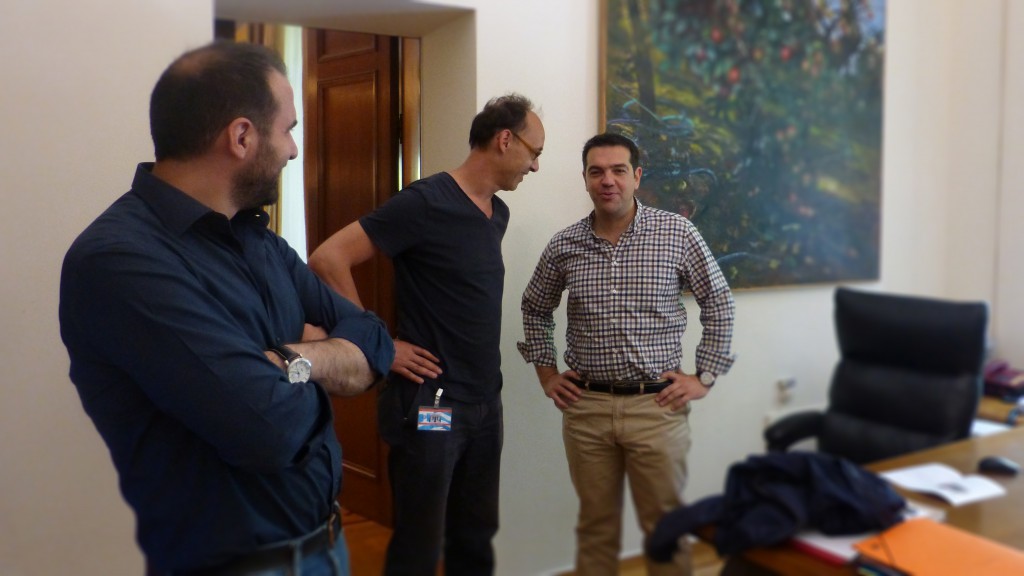 Tsipras is a friendly person but also a bit shy in reality. But the Tsipras of today is different to the one who I talked to two years ago at the Viennese Kreisky Forum. His voice is two octaves lower and gravely. He’s relaxed on this Saturday morning but unmistakeably tired, very very tired. You can sense that this man is under tremendous pressure, he’s being put through the mill and is completely exhausted. After a while he suddenly says: “It’s all very quiet here.” He probably means astoundingly quiet. No hysteria. No mass demonstrations. No burning barricades. What I hadn’t realised yet was the fact that the prime minister knew that behind the relaxed facade, the level of anxiety was increasing day by day. The Greeks will panic and take out about a billion euros by the end of this week. It’s a quiet run on the banks while the Greek economy is practically standing still, waiting for it to become clear how the current confrontation between creditors and debtors will end and, at the same time, Tsipras is being squeezed between the threats of the Euro group and his own people, some of who won’t continence even the smallest of compromises.
Tsipras is a friendly person but also a bit shy in reality. But the Tsipras of today is different to the one who I talked to two years ago at the Viennese Kreisky Forum. His voice is two octaves lower and gravely. He’s relaxed on this Saturday morning but unmistakeably tired, very very tired. You can sense that this man is under tremendous pressure, he’s being put through the mill and is completely exhausted. After a while he suddenly says: “It’s all very quiet here.” He probably means astoundingly quiet. No hysteria. No mass demonstrations. No burning barricades. What I hadn’t realised yet was the fact that the prime minister knew that behind the relaxed facade, the level of anxiety was increasing day by day. The Greeks will panic and take out about a billion euros by the end of this week. It’s a quiet run on the banks while the Greek economy is practically standing still, waiting for it to become clear how the current confrontation between creditors and debtors will end and, at the same time, Tsipras is being squeezed between the threats of the Euro group and his own people, some of who won’t continence even the smallest of compromises.
Yes everything is peaceful and hardly anybody is in Maximos Mansion but metaphorically this morning Alexis Tsipras is something like besieged, a situation similar to Salvador Allende in Chile forty years ago. The only difference is that nowadays you don’t need tanks and generals to cut off the air of an unwanted prime minister. The central bank mangers from Frankfurt are enough for that. “There’s enormous pressure, and we are facing dilemma, which we never imagined to meet in our political lives,” says somebody from the inner circle of the prime minister.
But the tense anxiety is only one of the realities of this city. Athens is humming and people don’t look very pessimistic. “People are patient with the government because they tell themselves, better inexperienced young people than the corrupt old ones,” says Konstantina Zöhrer, an Austrian-Greek political scientist.
“Tsipras has got the chance to dominate Greece for the next 20 years if he manages to keep to the political middle,” Maria Eleni, who is not a friend of exaggerated political radicalism and who used to sit for seven years in the European Parliament for the socialist party Pasok, which was pretty much destroyed by Syriza. “Young liberal people voted for Syriza along with former Pasok voters and former voters of the Conservative party,” my friend Yannis says. The young freelancer works part time for the media and part time for an agricultural business. We are walking up Kominion street, near the famously anarchist Exarchia district. Of course, he tells me that these voters aren’t hard left. “They don’t want a confrontational government. They want one that also has a feel for consensus and compromise.” This sounds a little like criticism of Tsipras and his people, and it is, but it is as far as anyone in Athens will go in their criticism, a sort of solidarity in criticism, made with a friendly gesture for the Syriza government. This can simply put down to the fact that people, even if they aren’t natural sympathisers with the left, know that modern thinking people surrounding Tsipras and Co. are the best thing that could have happened to Greece, that they are the only ones who can destroy corrupt and obsolete structures, and that they are the only ones who can replace the old aggressive partisan style of Greek politics, where parties are more like feuding families, with their own professional style. It is, in a nutshell, the criticism of people who want their choice to try even harder, and is far from absolute refusal. Tsipras has approval ratings of a remarkable 74%, and this isn’t for nothing. And so there is something unusual hanging over the city – something that we Europeans further north haven’t seen in a long time with our constant, vague suspicions about the performance of our grey political elites – almost like revolution is coming. The feeling is so strong that it is too easy to forget the other Greece, the country on the brink. These are the days when talks with Europe are reaching a head and nobody knows if Greece will be bankrupt or not next week. Will there be a deal that will give the country another chance? Or will there be some other outcome?
Panepistimiou Street is one of the biggest boulevards of Athens, just a stone’s throw from the central Syntagma Square and from Parliament. In this district, Athens looks as stylish and tidy as any other historic, international city, like Paris, Rome or Vienna. In front of the Numismatic Museum, the midday sun is burning, but behind, the museum café is under the trees in the park. Theodoros Paraskevopoulous takes a drag on his unfiltered cigarette with the appearance of being calm. There are still a few days of brouhaha to come but he’s sure that a compromise will be found in the end. Paraskevopoulus is one of the Syriza old guard. Today his official job in parliament is to coordinate party and government. But he is much more than that: he is Tsipras closest confidant, a fatherly friend of the prime minister, who can cry on his shoulder when he needs to.
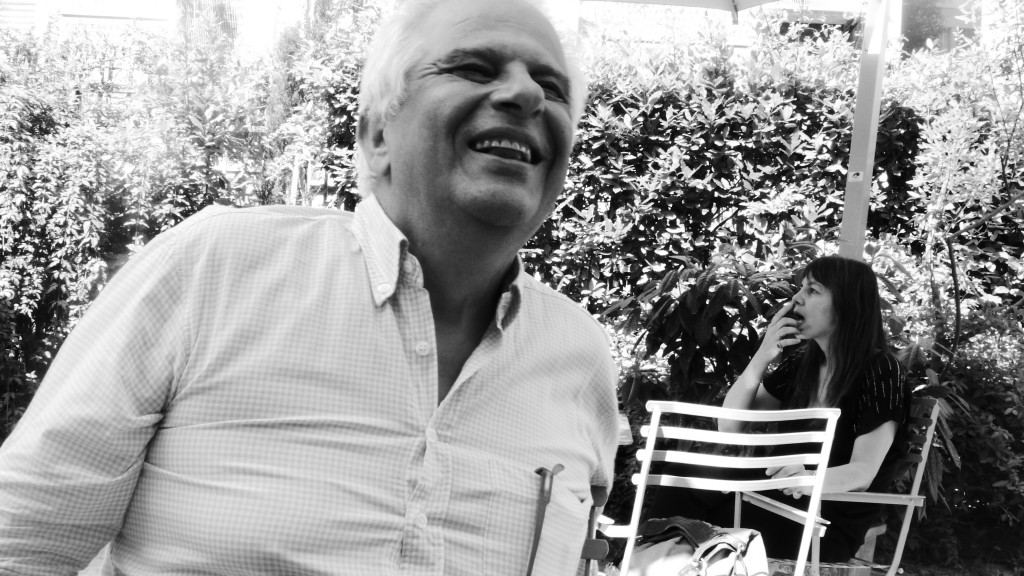 Paraskevopoulos has the task of taming the bedlam, gently, by talking and acting as a go-between, not through threats or the party whip. Syriza is an alliance of left and radical left parties, and there isn’t even a unified “majority block”. The different organised movements meet up before every party meeting. Most of them have three or four policies that encapsulate their identity, but these policies are not particularly important in the new world of government, which means that quite a few of them now belong to the movement just out of habit. Syriza is a party where there is a lot of discussion and there is a lot of dissent. In a party like this, the prime minister can’t take it for granted that he will be able to assert himself. But how can you govern this way? Paraskevopoulos doesn’t understand the question, “It is absurd that people from the old parties, like Pasok, that have disappeared because they stopped discussing issues are now advising us that we should be like them,” he says.
Paraskevopoulos has the task of taming the bedlam, gently, by talking and acting as a go-between, not through threats or the party whip. Syriza is an alliance of left and radical left parties, and there isn’t even a unified “majority block”. The different organised movements meet up before every party meeting. Most of them have three or four policies that encapsulate their identity, but these policies are not particularly important in the new world of government, which means that quite a few of them now belong to the movement just out of habit. Syriza is a party where there is a lot of discussion and there is a lot of dissent. In a party like this, the prime minister can’t take it for granted that he will be able to assert himself. But how can you govern this way? Paraskevopoulos doesn’t understand the question, “It is absurd that people from the old parties, like Pasok, that have disappeared because they stopped discussing issues are now advising us that we should be like them,” he says.
Paraskevopoulos thinks the solution to Greece’s problems could be so easy, and he starts to explain the numbers. primary surplus of 0.75% to 1% in the Greek budget, and in return no further pension cuts and no further deregulation of the labour market. Transferring the majority of Greek debts to the ESM, the European safety net, including the debts on the books of the IMF and ECB. Then Greece would have until 2022 to get back on its feet without having to pay huge interest and repayments. The country could catch its breath and could then start to slowly repay its debts. In fact, it wouldn’t just be the most sensible solution, but also the only one that could work economically. But being sensible has gone out of fashion in Brussels.
There are a thousand things to do, all at the same time. On the one hand, the young government has to negotiate with the creditors, which takes up a lot of their energy. On top of that, the chronic insecurity stops the Greek economy from recovering because nobody, unless they are completely crazy, wants to invest with the threat of Grexit hanging over them, and the government should have started modernising the country and infrastructure by now. Here everybody knows that, as Tsipras‘ chief of staff, Tzanakopoulos, ironically said, “Greek public administration is not an example of best practice. And on top of that normal government has to happen, which means that the social minister has to ready the social systems, the heath minster, the health system, and for all of that there are hardly any plans, not enough time and even less money.
Haris Triandafilidou is another of the “Germans” in the prime minister’s office. She’s the type of person who is unhappy that there are only 24 hours in a day. She’s always highly stressed, wears her hair up, she’s thin and when she talks in her slightly argumentative way, she reminds me a little of Sahra Wagenknecht, but only for a second. Then she makes a joke and her seriousness dissolves into laughter. Of course, the tax dodgers and cheats haven’t had their collars felt yet. First, we are collecting the data, then trials will start, and parliament has allowed the authorities access to private accounts. “The Greek professionals classes, who aren’t used to having to pay tax, are feeling anxious for the first time.” Like all Syriza people you meet these days, she’s rally proud of two policies which have just passed the parliament. The law about same sex partnerships and the new citizenship law, which guarantees children of immigrants automatic citizenship from the day they start school. “We won the majority in Greece because of our economic and social demands,” she says, “but the people’s trust has spilled over into other issues.” Because the left is the dominant power, it can also appeal to people on issues of the liberalisation of society.
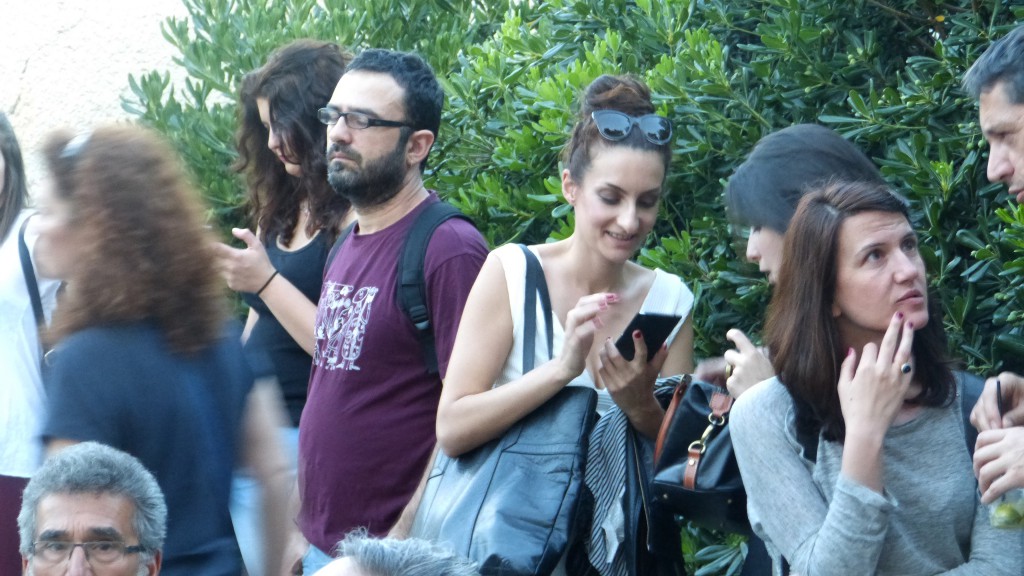 Haris checks her phone every few minutes, just to see if the world has ended yet. Then we have to go to an event thrown by the left NGO network, Solidarity4all, which is close to Syriza. The news is on in the taxi, and I make out the words „Merkeel“and „Apocalypse“. An activist from Ecuador is talks under the oleanders about “economic solidarity”, cooperatives and worker participation in management. Everyone listens with interest to what he has to say about plans for the collective economy to be included in the constitution.
Haris checks her phone every few minutes, just to see if the world has ended yet. Then we have to go to an event thrown by the left NGO network, Solidarity4all, which is close to Syriza. The news is on in the taxi, and I make out the words „Merkeel“and „Apocalypse“. An activist from Ecuador is talks under the oleanders about “economic solidarity”, cooperatives and worker participation in management. Everyone listens with interest to what he has to say about plans for the collective economy to be included in the constitution.
“Tell me, are you trying to bring in socialism here?” I ask Haris. “Yes,” she says, in a tone that implies I would have to be crazy to doubt it. I’d already asked Dimitris Tzanakopoulos, the chief of staff, the same question. He had answered, somewhat more diplomatically, that “it was a tricky question,” and that it wasn’t about terms like “socialism,” or “whateverism.” “First, we want to break the neoliberal, conservative hegemony in Europe.” Then he impishly says something that was to stay with me, “the sky’s the limit!”
These are the moments where I catch myself wondering if they have gone nuts. They live in a country that has been devastated by the crisis, in which hardship and poverty have become endemic, standing on the edge of bankruptcy in the Europe of Merkel and Schäuble, and they think that socialism is just around the corner? But before I can ask this question, another question immediately springs to mind. What if we are really the ones who have gone nuts? We, meaning the ones who are happy at having avoided the worst, we who panic at the smallest changes, at even the hint of a bold idea. Suddenly I’m not sure anymore if it is them who are crazy, or maybe us?
Syriza is an open-ended project. But the party today is more than that: it has become a role model of a successful party of the left within twentyfirst century west European, and it has done this by earning a few lessons: populism as a good thing that talks to the normal, average people as “we” in a language that is significantly different to insider or bureaucratic jargon. Previously the left, from activists to union functionaries, spoke in technical jargon, just like their contemporary left parties across Europe. It’s no coincidence that many of the very well educated Syriza people have not only studied at the London school of Economics, but also at the University of Essex, where the philosopher, Ernesto Laclau, has been lecturing for decades about his theories of hegemony and “populist reason”. The Spanish Podemos party is a similar project – although significantly different because Podemos is practically a top-down project run by five friends, while Syriza took a long time in its formation. “The left has to look more like the people,” says Podemos leader Pablo Iglesias. The goal is to create discursive structures which enable the underprivileged and the impoverished middle class the ability to identify and find themselves in this image of the new “we” which is seen in opposition to a “they”, the opponents: the old elites.”
Thessaloniki. I blink away sleep as rain lashes through the window into my face. A hard rain’s a-gonna fall. The heavens open, and the rain is coming down in sheets, as if trying to wash the owls from the trees. In the room next door, Katerina is slamming the shutters. Her new job makes her responsible for the party’s relationship with all the solidarity, social and grass-roots movements across Greece. We are walking to the local Syriza office, and there, with a few girlfriends, she packs a car with some plastic bags with disposable nappies, sanitary towels, toys, food, water, toothbrushes and toothpaste. Katerina, along with a few like minded people, has started the “little shopping basket” initiative. The idea is simple: people bring everyday goods and they are given to the people who can’t afford the bare necessities, whether Greek or not doesn’t matter. We travel round the city looking for refugees stranded for the night in the second-biggest city in Greece. A city that does nothing more for refugees than set up four portable toilets. Near the main station we find several families from Afghanistan who are camping in a park. The women give all the things to them. “Look after yourselves,” Katerina shouts, revealing the small gap in her teeth. She gives everyone her winning laugh, part of her immense friendliness, that nobody can resist for very long. Her brown hair blows into her face.
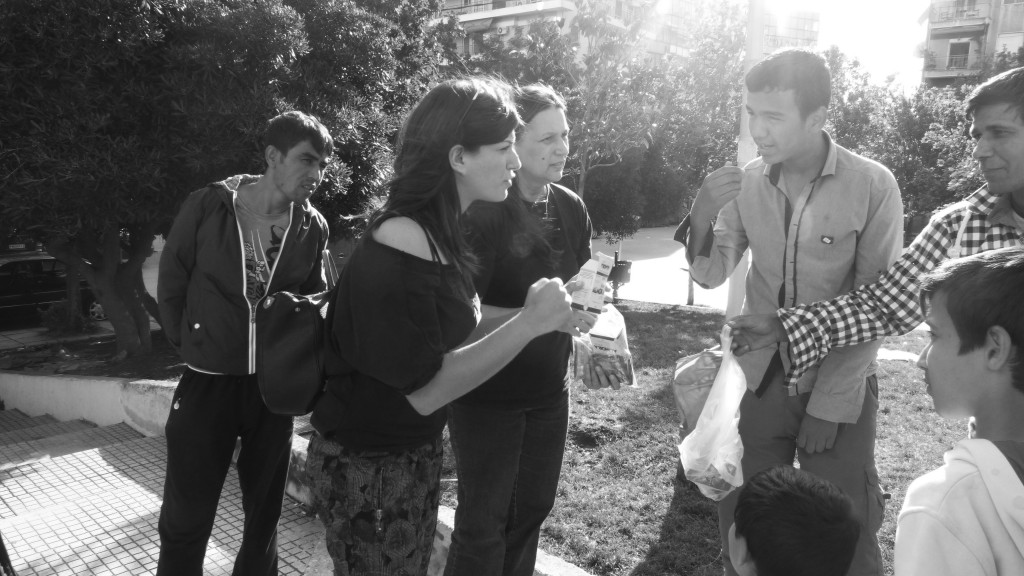 Later, I’m sitting on a park bench with one of the women. She tells me that she is unemployed and that she’s happy if she can even get a job for month, three or four times a year. That’s all that’s going. I calculate that, at best, she must be getting about 3,000 euros per year, and that she has to spread it through the other months. Even commuting into town is a problem. Every return ticket by bus costs 2.40 and that’s a lot of money for her. I doubt she can afford to do it more than ten times a month. The thought that people in such a situation are looking for refugees to help makes me feel ashamed, particularly when I think about the hysterical campaigns against refugees at home.
Later, I’m sitting on a park bench with one of the women. She tells me that she is unemployed and that she’s happy if she can even get a job for month, three or four times a year. That’s all that’s going. I calculate that, at best, she must be getting about 3,000 euros per year, and that she has to spread it through the other months. Even commuting into town is a problem. Every return ticket by bus costs 2.40 and that’s a lot of money for her. I doubt she can afford to do it more than ten times a month. The thought that people in such a situation are looking for refugees to help makes me feel ashamed, particularly when I think about the hysterical campaigns against refugees at home.
Next stop is the “solidarity clinic”. Thirty percent of Greek people have no health insurance. That means three million people who can’t go to the doctor in an emergency. Hundreds f thousands are without power because they couldn’t pay the bills. “There were thirty of us, crazy people who decided to set up a hospital,” Katerina laughs. Now 300 volunteers work for the hospital, and another 300 doctors have opened their doors for the people that the solidarity clinic sends their way. The solidarity clinic is squeezed onto one floor of an old union building in the poor western part of the city. “Dentists, gynaecologists, GPs, we have everything here. Pregnant women have to pay 900 euros per birth to go to a normal hospital. There have even been cases where, if women couldn’t pay, hospitals kept the babies, and only released the newborns when the women paid.”
 These are places where the humanitarian disaster really stares you in the face. Elsewhere, you have to search to find images of the crisis. It’s not a part of everyday life. People are dressed stylishly. The cafés and bars are full, even if only because you have to go out if you don’t want to give up completely, and they are where people go to network and interact with the informal economy. It’s only when you look more closely that you realise that people are nursing their beer for three or four hours or drinking the water they can get for free. Almost every Greek person owns their own home, which means living costs are low. People with second homes, rent them out, often the tenants aren’t able to pay the rent any more and just stay in the flats. Barter and the informal economy is flourishing. One person can repair a computer, while the other has a bit of land. People help each other, or try to start whatever business they can, which might bring them one or two hundred euros er month. People are just getting by, and it provides just enough to prevent the poverty from becoming apparent. You have to ask, to scratch the surface, for it to reveal itself. When you talk to people, you realise what the “Great Recession” means; when a young woman tells about her father who is a lecturer at university, the only one of them who still has a job, has had his pay cut from 1,800 to about 900; that her mother who used to be paid well is now unemployed because the company went bankrupt; that one sister is unemployed and the other still has a job, waitressing twice a week for 120 euros a month. Her grandmother has a small pension of 400 euros. The brother, almost 40, has had to move back in with his parents, which was a great defeat and loss of independence for him. Which means that, at best, six people have to live off 1,420 euros. The mortgage for the flat is in arears. And you have to realise that this is the new normal for the upper middleclass, and not a story of poverty from the edges of society. It means permanent vulnerability, just a step away from complete disaster.
These are places where the humanitarian disaster really stares you in the face. Elsewhere, you have to search to find images of the crisis. It’s not a part of everyday life. People are dressed stylishly. The cafés and bars are full, even if only because you have to go out if you don’t want to give up completely, and they are where people go to network and interact with the informal economy. It’s only when you look more closely that you realise that people are nursing their beer for three or four hours or drinking the water they can get for free. Almost every Greek person owns their own home, which means living costs are low. People with second homes, rent them out, often the tenants aren’t able to pay the rent any more and just stay in the flats. Barter and the informal economy is flourishing. One person can repair a computer, while the other has a bit of land. People help each other, or try to start whatever business they can, which might bring them one or two hundred euros er month. People are just getting by, and it provides just enough to prevent the poverty from becoming apparent. You have to ask, to scratch the surface, for it to reveal itself. When you talk to people, you realise what the “Great Recession” means; when a young woman tells about her father who is a lecturer at university, the only one of them who still has a job, has had his pay cut from 1,800 to about 900; that her mother who used to be paid well is now unemployed because the company went bankrupt; that one sister is unemployed and the other still has a job, waitressing twice a week for 120 euros a month. Her grandmother has a small pension of 400 euros. The brother, almost 40, has had to move back in with his parents, which was a great defeat and loss of independence for him. Which means that, at best, six people have to live off 1,420 euros. The mortgage for the flat is in arears. And you have to realise that this is the new normal for the upper middleclass, and not a story of poverty from the edges of society. It means permanent vulnerability, just a step away from complete disaster.
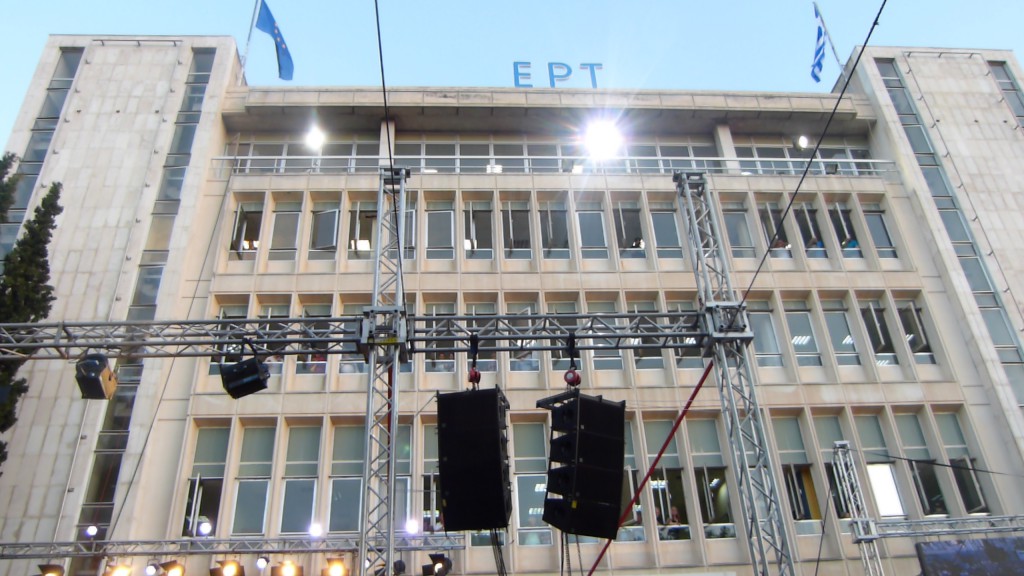 Katerina suggests that we visit a gathering at the national broadcaster ERT that evening, a suggestion that I like very much because I was at a celebration to mark the reopening of the broadcaster the week before. It was a big party, with crowds packed in between the bushes, the smell of mint in the air. A communist agitator gives a speech from the loading ramp of a lorry while numerous small left groups are handing out fliers. Street vendors are doing a roaring trade with beer and skewers. In front of the entrance to the broadcaster’s building a stage has been set up for a symphony orchestra to play Verdi, with the conductor almost falling off the stage at the dramatic parts. It has been an important Friday for Greece, which is fighting austerity because the fight for the public broadcaster has become symbolic. The previous government turned it off from one day to the other, but the staff just kept on working and broadcast their shows via the internet. The channel came back on air last week. It is a new company with fewer people, a real public broadcaster, we all hope. Of course, people’s trust in Syriza isn’t bottomless. Many wonder if Syriza will just do things the same way as the governments who have went before, and use the national radio and TV network for embarrassing party propaganda. Syriza promises that they will resist this temptation. But can you rely on that? Nobody is betting on it. People are not naive or uncritical.
Katerina suggests that we visit a gathering at the national broadcaster ERT that evening, a suggestion that I like very much because I was at a celebration to mark the reopening of the broadcaster the week before. It was a big party, with crowds packed in between the bushes, the smell of mint in the air. A communist agitator gives a speech from the loading ramp of a lorry while numerous small left groups are handing out fliers. Street vendors are doing a roaring trade with beer and skewers. In front of the entrance to the broadcaster’s building a stage has been set up for a symphony orchestra to play Verdi, with the conductor almost falling off the stage at the dramatic parts. It has been an important Friday for Greece, which is fighting austerity because the fight for the public broadcaster has become symbolic. The previous government turned it off from one day to the other, but the staff just kept on working and broadcast their shows via the internet. The channel came back on air last week. It is a new company with fewer people, a real public broadcaster, we all hope. Of course, people’s trust in Syriza isn’t bottomless. Many wonder if Syriza will just do things the same way as the governments who have went before, and use the national radio and TV network for embarrassing party propaganda. Syriza promises that they will resist this temptation. But can you rely on that? Nobody is betting on it. People are not naive or uncritical.
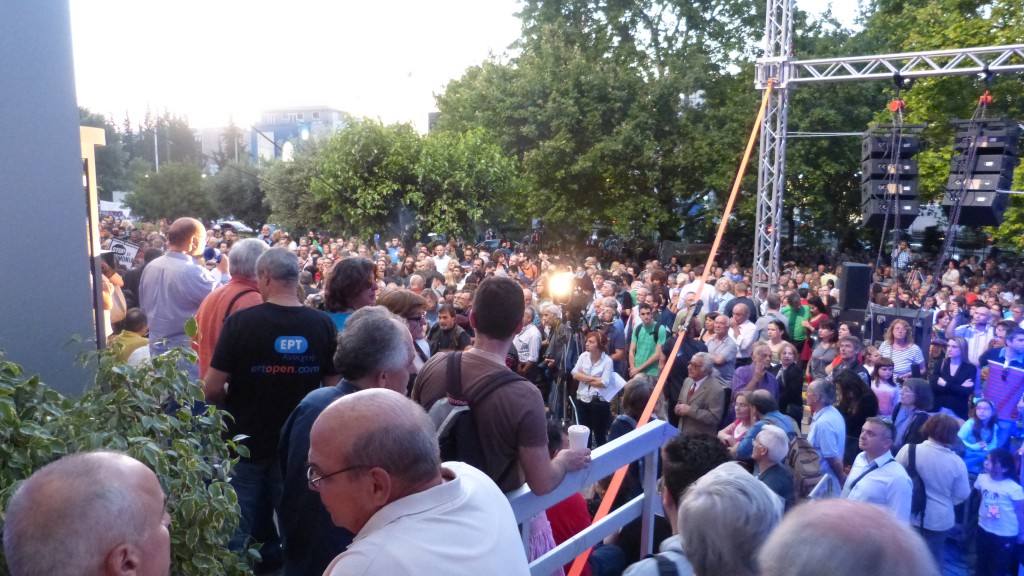 The stars of the new government were all there. Yanis Varoufakis, the finance minister Zoe Konstantopoulou, the parliament president. Rena Dourou, the charismatic governor of the central province of Attica, based on her position of regional power she is a kind of Erwin Pröll for Syriza. The crowd applauds as the first news broadcast of the new era flickered on a video wall, and many are applauding in that strange, overenthusiastic way of people who are trying to demonstrate something. A sort of victory celebration.
The stars of the new government were all there. Yanis Varoufakis, the finance minister Zoe Konstantopoulou, the parliament president. Rena Dourou, the charismatic governor of the central province of Attica, based on her position of regional power she is a kind of Erwin Pröll for Syriza. The crowd applauds as the first news broadcast of the new era flickered on a video wall, and many are applauding in that strange, overenthusiastic way of people who are trying to demonstrate something. A sort of victory celebration.
Here in Thessaloniki, the home of broadcaster ERT3, everything is a little more subdued and the mood is very different. And now I know a little better what this is all really about, after the old government closed the channel down, and a part of the staff continued to work on their own, the former public broadcaster didn’t just become free, they also went a little wild. Activists from the left and ordinary citizens provided support, and a lot of them even learned how to make a TV show. It really became a kind of citizens‘ broadcaster – with no regulations, which didn’t matte as long as the government didn’t turn off the power. Now that Syriza has brought the national broadcaster back, there is again a need for some kind of regulation. The people from the movement are worried that their broadcaster is going to be taken away from them again. A lot of them are angry at Syriza, even though the government has not put their people in place at the top of the broadcaster. They have actually reinstated the old controller as the new number two and installed a university professor at the top who was once a Pasok party member and has now opportunistically switched sides.
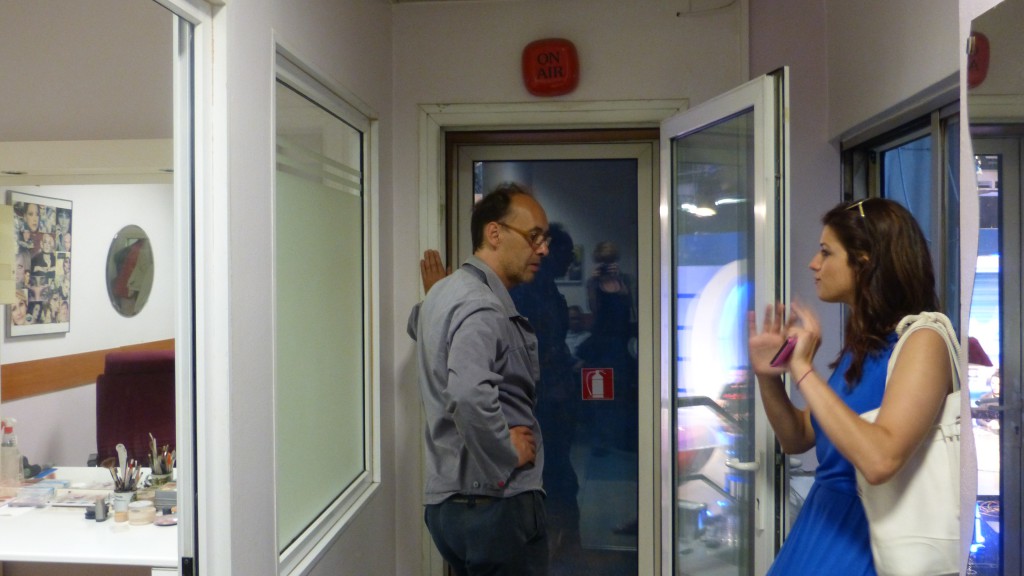 In the corner building where the broadcaster is based, the biggest problem for everybody is space. The management are stuffed into cramped offices and some of the work is being done outside in temporary buildings. The desks look a little like they are held together by tape. The controller is sitting in the corridor on a sofa that has seen better days. “You must be that video blogger,” a man says in German, with a thick Swabian accent, as I’m trying to force my way back in through the front door. It’s Athanasios Marvakis, who he turns out to be a professor of clinical psychiatry at Aristotle University, and he was himself very active in the solidarity movement during the switch-off. He understands the Syriza position, but he’s critical at the same time, “It’s true, they don’t have an absolute majority, which means they have to keep the other parties happy. So they made the Pasok choice the director general. And besides, the whole place is going up in flames, so they don’t want any more problems. You can understand why they did it. But for the people who fought for this broadcaster and for the producers, who kept the thing going, without pay, it’s a bitter pill to swallow.” So a rebellious people’s broadcaster has now gone back to what it was before, except now there are two bosses trying to run it. “Of course, you have to put a regular structure back in place, but the problem is that in Greece we don’t have any culture or know-how about how to give the people a say in the running of a public broadcaster. The usual structure, like you find in Germany, where the regional public broadcasters of ARD have, for example, programming advisory boards, where the church, unions and political parties are equally represented, there’s nothing like that here. Not that this is a perfect solution, but it is at least one way to set up radio and TV that is national but, because of the way it is organised, also relatively independent from direct interference from the government.”
In the corner building where the broadcaster is based, the biggest problem for everybody is space. The management are stuffed into cramped offices and some of the work is being done outside in temporary buildings. The desks look a little like they are held together by tape. The controller is sitting in the corridor on a sofa that has seen better days. “You must be that video blogger,” a man says in German, with a thick Swabian accent, as I’m trying to force my way back in through the front door. It’s Athanasios Marvakis, who he turns out to be a professor of clinical psychiatry at Aristotle University, and he was himself very active in the solidarity movement during the switch-off. He understands the Syriza position, but he’s critical at the same time, “It’s true, they don’t have an absolute majority, which means they have to keep the other parties happy. So they made the Pasok choice the director general. And besides, the whole place is going up in flames, so they don’t want any more problems. You can understand why they did it. But for the people who fought for this broadcaster and for the producers, who kept the thing going, without pay, it’s a bitter pill to swallow.” So a rebellious people’s broadcaster has now gone back to what it was before, except now there are two bosses trying to run it. “Of course, you have to put a regular structure back in place, but the problem is that in Greece we don’t have any culture or know-how about how to give the people a say in the running of a public broadcaster. The usual structure, like you find in Germany, where the regional public broadcasters of ARD have, for example, programming advisory boards, where the church, unions and political parties are equally represented, there’s nothing like that here. Not that this is a perfect solution, but it is at least one way to set up radio and TV that is national but, because of the way it is organised, also relatively independent from direct interference from the government.”
It is almost like establishing a kind of order after revolution, and the revolutionaries feel like they have been booted out of government, and they don’t like it, that the days of chaos, that were also days of wild freedom, are at an end – except we aren’t talking about a revolution, we’re talking about what, on the surface, was a normal transfer of government. The old wasn’t working any more, but the new hasn’t yet been found. In a way, it’s the same story for everything in Greece at the moment.”
I’m sitting with Giorgos Goniadis in a tavern in Krini, on the outskirts of Thessaloniki. Goniadis is a young man in his late twenties, glasses, beard, checked shirt. He is one of those young people who are full of energy and the will to get things going in crisis battered Greece again. He is half political activist, half business man, and full of idealism. “We need honest voices in politics, and we don’t have them yet.” He isn’t really a fan of Syriza, but even less an opponent. “I love politics,” he says, and then adds, “in theory.” He laughs. What he is saying is that things are unsavoury in practice. Along with Yannis, who I talked to in Athens, he fears that the Syriza government won’t live up to the expectations that he too has in them – in other words the yearning for a, let’s call it, “modernisation of the liberal left.” But that doesn’t matter, Giorgos has a motto, “Nothing will ever change if I don’t change it.” So he just started changing things. As a young unemployed man, but with some savings, he found himself thinking, “I could live off my savings, but they won’t last long.” So he simply started a company. His company, “Papigion” (www.papigion.gr), makes bow ties, the kind that goes with a tuxedo, or, for nerds, a colourful shirt. Goniadis slowly built up a clientèle. “At the start, it was a kind of adventure.” But the adventure worked out. Of course, his company doesn’t make much of a profit, he still can’t afford health insurance and every increase in taxes is a tough setback for his business plan. But things are going pretty well. And Goniadis doesn’t just want to build up a company. He wants to prove something, “All my material is the finest quality from local suppliers. I make sure the tailoring is done locally. I pledge to my customers that my investments always flow into the local economy. This is the only way to jumpstart the Greek economy again. Also, I save on transport costs and my products have a sustainable environmental footprint.”
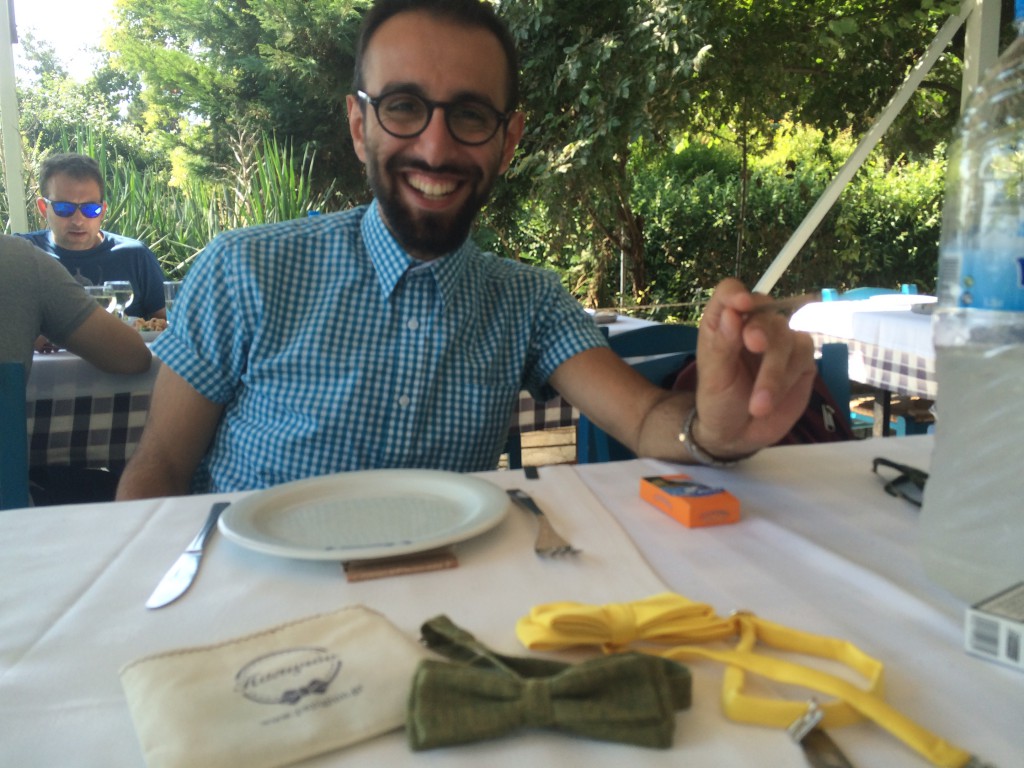 It is an idea, a small one, but an idea. And it’s an idea that has already brought changes. The young businessman has an income. His suppliers have an income. And, who knows, one day his bow ties might become a big hit in the global marketplace.
It is an idea, a small one, but an idea. And it’s an idea that has already brought changes. The young businessman has an income. His suppliers have an income. And, who knows, one day his bow ties might become a big hit in the global marketplace.
There are a lot of these small initiatives. Goniadis tells me about a “bio-coop” set up by customers, a shop in Thessaloniki that only does business with farmers and suppliers from the surrounding area. This directly creates jobs in the shop and indirectly creates jobs in the local agricultural sector, promotes switching to environmentally friendly produce and also ensures that Greece’s reduced buying power isn’t siphoned off by big multinationals like Nestlé. None of these things have a huge effect, but they do have small positive effects which can all add up to something huge.
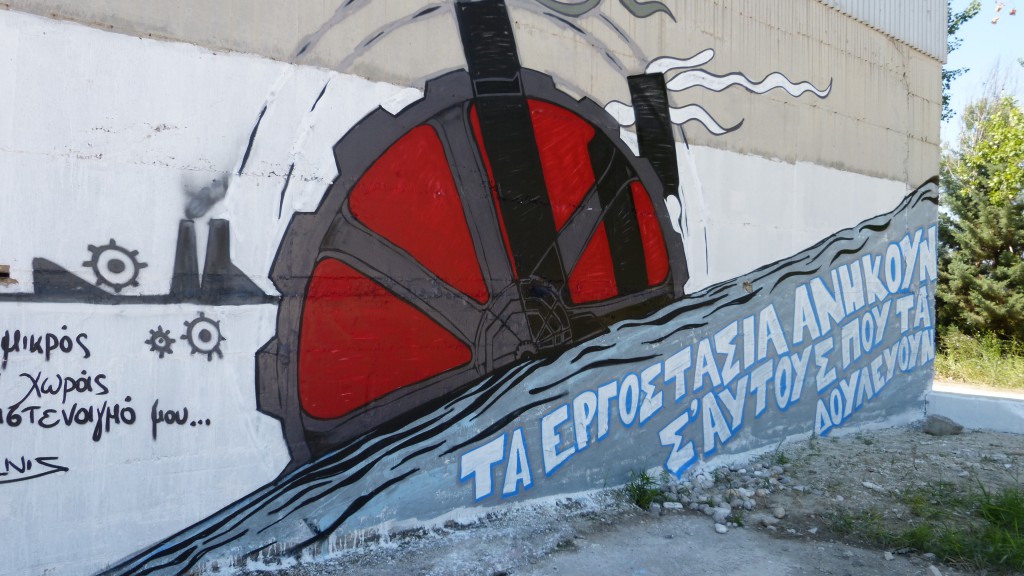 A few days later, way out in the industrial belt around Thessaloniki. Dimitis leans through an improvised peephole in a makeshift aluminium door and laughs. “Come in,” he says. Dimitris is one of the workers at VIOME, perhaps one of the most famous Greek factories. VIOME was a building materials manufacturer that was intended for closure by the owners. The workers went on strike, occupied the factory and, after a time, decided to run it and keep it going themselves. But they did a lot more than this. Production of building materials – cement, screed and the like – wasn’t economical any more, firstly because of competition from foreign companies, but also because the demand for building materials collapsed, because hardly anyone wanted to build a house during the crisis. So experts from the left joined them and did some market research. To put it in a nutshell: they tried to come up with an idea about what product would give the firm a chance at survival, and what could be made with the existing machinery without a lot of investment. “They told us the best bet was to make premium natural products,” Dimitris tells. Today VIOME makes environmentally friendly detergents and soap. There were around 60 workers working for VIOME before, and now only 12 are left. “We can get by. We can just get by.” The detergents are mixed in giant vats and lavender and palm oil is added. The cleaning products are poured into plastic bottles and there are thousands of bars of soap, waiting to be delivered to customers, all stacked up in the only corner of the giant factory building that the workers still need these days. A worker is at one table, adding the VIOME logo with a stamp and a hammer. He stops when Katerina asks him about the shavings of soap on the floor. She has suddenly had the idea of collecting up the little bits of soap and giving them to refugees from Syria and Afghanistan. The workers think it’s a great idea and they quickly have a bag full of them for her that she wants to take to the refugees straight away that day.
A few days later, way out in the industrial belt around Thessaloniki. Dimitis leans through an improvised peephole in a makeshift aluminium door and laughs. “Come in,” he says. Dimitris is one of the workers at VIOME, perhaps one of the most famous Greek factories. VIOME was a building materials manufacturer that was intended for closure by the owners. The workers went on strike, occupied the factory and, after a time, decided to run it and keep it going themselves. But they did a lot more than this. Production of building materials – cement, screed and the like – wasn’t economical any more, firstly because of competition from foreign companies, but also because the demand for building materials collapsed, because hardly anyone wanted to build a house during the crisis. So experts from the left joined them and did some market research. To put it in a nutshell: they tried to come up with an idea about what product would give the firm a chance at survival, and what could be made with the existing machinery without a lot of investment. “They told us the best bet was to make premium natural products,” Dimitris tells. Today VIOME makes environmentally friendly detergents and soap. There were around 60 workers working for VIOME before, and now only 12 are left. “We can get by. We can just get by.” The detergents are mixed in giant vats and lavender and palm oil is added. The cleaning products are poured into plastic bottles and there are thousands of bars of soap, waiting to be delivered to customers, all stacked up in the only corner of the giant factory building that the workers still need these days. A worker is at one table, adding the VIOME logo with a stamp and a hammer. He stops when Katerina asks him about the shavings of soap on the floor. She has suddenly had the idea of collecting up the little bits of soap and giving them to refugees from Syria and Afghanistan. The workers think it’s a great idea and they quickly have a bag full of them for her that she wants to take to the refugees straight away that day.
 “We are all equal here. Nobody is the boss and we all get the same share of the profits.” Distribution is still a little shaky. The soap is sold at solidarity events, or the workers sell it themselves at markets. And of course there are inquiries about exporting it. They are right in the middle of finishing a case for sending to Graz. It’s not yet exactly big business. The thought runs through my mind that these VIOME products would sell like hot cakes in green shops back home – environmentally friendly and made by brave workers in a factory they run themselves. Our latte macchiatto society will eat them up.
“We are all equal here. Nobody is the boss and we all get the same share of the profits.” Distribution is still a little shaky. The soap is sold at solidarity events, or the workers sell it themselves at markets. And of course there are inquiries about exporting it. They are right in the middle of finishing a case for sending to Graz. It’s not yet exactly big business. The thought runs through my mind that these VIOME products would sell like hot cakes in green shops back home – environmentally friendly and made by brave workers in a factory they run themselves. Our latte macchiatto society will eat them up.
Who knows, perhaps the future of the Greek economy, at least in part, lies in factories like this, producing for a local market and for a market of international customers who want quality products. Greek companies, after all, are hardly going to be able any time soon to compete with Mercedes on productivity, or with the Chinese on price. The Greek economy has to seek out niches. How did Giorgos Goniadis put it? “Nothing will ever change if I don’t change it.” It seems that hippie start-ups aren’t so very different from the moustachioed blue-collar workers of VIOME.
We are sitting under the roof of a gazebo while the drama in Brussels is heading into its decisive hours. Do the technocrats and finance ministers of Europe think about these people when they are brooding over stacks of paper with column after column of numbers? Do they even know how things are here in the real world? At the end of this week they want to tighten Tsipras’s proposal into an even more brutal austerity program, and combine this with an ultimatum, as if the language of blackmail and warmongering has become the language of the European Union, even though it was founded as a partnership between free and peaceful nations. This Saturday night, Alexis Tsipras threw a spanner in the works by announcing a referendum on their latest “take-it-or-leave-it” proposal and by recommending a No vote to his citizens. It was a kind of last-ditch attempt, from a man who couldn’t and didn’t want to surrender but who was effectively standing with his back to the wall. At this moment I again remember this sentence, “We are facing a dilemmata that we never imagined we would experience in our political lives.”

Ein Gedanke zu „My Greece. The Journey Inside Syriza.“